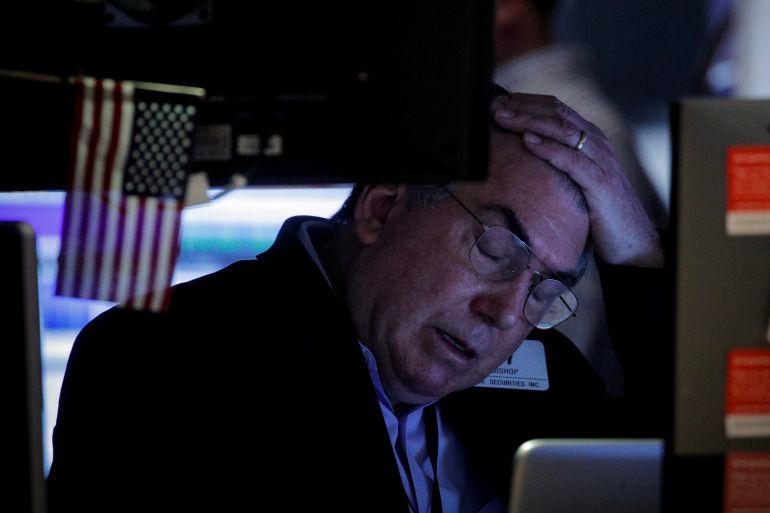Stocks sink on Powell’s hawkish taper remarks, Omicron alarm
Fed Chair Jerome Powell signalled the United States central bank would consider speeding up its withdrawal of bond purchases as inflation risks increase. That further upset markets already battered by the looming threat of the Omicron COVID-19 variant.

Wall Street’s main indexes closed lower on Tuesday after Federal Reserve Chair Jerome Powell signalled that the United States central bank would consider speeding up its withdrawal of bond purchases as inflation risks increase, piling pressure onto a market already nervous about the latest COVID-19 variant.
In testimony before the Senate Banking Committee, Powell indicated that he no longer considers high inflation as “transitory” and that the Fed would revisit the timeline for scaling back its bond-buying programme at its next meeting in two weeks.
Keep reading
list of 4 itemsUS consumer confidence falls in November as inflation bites
Powell says Fed could speed up bond tapering to counter inflation
Text messages between Elizabeth Holmes and Sunny Balwani released
The S&P 500 – a proxy for the health of retirement and college savings accounts – lost 88.27 points, or 1.9 percent, to end at 4,567 points, while the tech-heavy Nasdaq Composite Index lost 245.14 points, or 1.55 percent, to 15,537.69. The Dow Jones Industrial Average fell 652.11 points, or 1.86 percent, to 34,483.72.
“Powell’s comments threw a monkey in the wrench in market thinking in terms of potential taper timing. You’re seeing as a result of that, risk-off across the board,” said Michael James, managing director of equity trading at Wedbush Securities in Los Angeles.
“You also have to factor in the Omicron variant concerns. You can argue whether they’re more headline risk or reality risk but regardless, it’s having a significant impact on oil, and everything that’s tied to economic growth.”
Powell’s comments also prompted speculation among some investors about a potential acceleration in interest rate hikes.
“The principal contributor to the decline in stock prices today is the Powell commentary, regarding the upcoming Fed meeting, about accelerating the tapering of their bond-buying programme, which obviously leads to the prospect that rate hikes come sooner next year,” said Mark Luschini, chief investment strategist at Janney Montgomery Scott in Philadelphia.
“That somewhat hawkish shift in tone caught the market flat-footed,” Luschini said.
Meanwhile, the market was also left waiting for information about how dangerous the Omicron variant might be, the degree to which current coronavirus vaccinations could offer protection and the additional restrictions governments might have to impose that could hurt the economy, Luschini said.
Tuesday’s declines were broad-based, with all the 11 major S&P sectors down. Communication services was the lead decliner by late afternoon. As oil prices tumbled, energy was also under pressure throughout the session.
Monday’s rally saw stocks regain some of the ground they had lost on Friday when the market first sold off on news of the virus variant.
While the US Food and Drug Administration said it hopes to have information about the effectiveness of current COVID-19 vaccines against Omicron, vaccine companies appeared divided.
BioNTech’s chief executive said the BioNTech and Pfizer COVID-19 vaccine will likely offer strong protection against severe disease from the variant, while Moderna Inc’s CEO told the Financial Times that COVID-19 shots are unlikely to be as effective against the new variant as they have been previously.
Moderna shares fell while those of Regeneron Pharmaceuticals Inc were also under pressure after it said its COVID-19 antibody treatment and other similar drugs could be less effective against Omicron.
Travel and leisure stocks slumped, with S&P 1500 Airlines and the S&P 1500 Hotels, Restaurant and Leisure indexes both declining on concerns of more border restrictions.
The virus uncertainty has triggered fresh alarm at a time when supply chain logjams are weighing on economic recovery and central banks globally are contemplating a return to pre-pandemic monetary policy to tackle a surge in inflation.